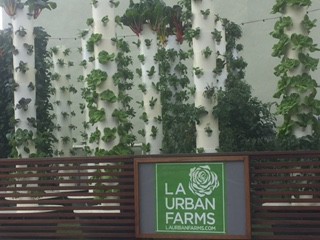Fresh, nutrient dense produce is accessible year round now thanks to vertical farms and freight containers. Today’s farmer doesn’t need overalls, gloves, soil or even sunshine thanks to innovators within the tech/food space who are passionate about empowering people to grow produce in urban settings.
I recently visited Food & Bounty restaurant on the lot of Sunset Gower studios, the commissary restaurant is owned by Chef Helen Cavallo. The restaurant had a wasted 20×20 space right outside in the studio lot that used to be a smoking section back in the day. It remained dead space until two years ago when LA Urban Farms Founder Wendy Coleman suggested that Chef Helen transform the space into a Tower Garden farm that grows vegetables, fruits, herbs, edible flowers and customized products such as wasabi arugula that would all be just 15 feet away from her kitchen.
It was easy to convince Helen of the benefits of adding 15 garden towers to that small space, taking what would normally require about 4,000 square feet of land and creating a magical garden in that concrete jungle. The lush greenery is a sight for sore eyes on the studio lot.
Chef Helen was full of enthusiasm as she and Wendy gave me a tour and tasting of the Food & Bounty garden. Every dish and smoothie in her restaurant takes full advantage of the abundant fresh, healthy, nutrient dense produce that is cut only when needed and sprinkled right into dishes for added aroma and freshness. LA Urban Farms maintains the site’s garden towers with a real effort to be collaborative with Helen’s visions for special seasonal and unique recipes.

Wendy Coleman’s business partner, Niels Thorlaksson runs the gardening and maintenance part LA Urban Farms. His mother is also involved as she plants and nurtures tens of thousands of seedlings in the backyard of her Santa Barbara home. The seedlings are then used for LA Urban Farms many other clients that include educational institutions, restaurants, chefs, hotels, resorts, corporate office spaces, individual home clients, Los Angeles Mayor Eric Garcetti’s home at the Getty House, and also the L.A. Mission.
At Food & Bounty, they grown up to 700 plants per month. Wendy says, “We hope that this partnership is a model for the future of local food and one that aims to combat the fact that the average bite of food in America travels over 1,500 miles before it’s served; losing nutritional value and wasting resources along the way.” Coleman adds that the vertical farms use less than 90% of the water of a traditional garden and eliminates the use of harmful herbicides and pesticides.
These patented vertical aeroponic growing systems called Tower Gardens were developed by Tim Blank after he worked at Disney’s Living with the Land Pavilion for 12 years where he was the lead horticulturist.
LA Urban Farms is a full service distributor of Tower Gardens. Coleman says the benefits of urban gardens are abundant:
- The Tower Garden is versatile enough to grow almost any vegetable or fruit that doesn’t grow on a tree (such as apples) or in the soil (such as potatoes) as well as herbs and edible flowers.
- There are no pesticides or herbicides used.
- Greater sustainability, less labor required and healthy food made accessible.
- The aeroponic technology and specially formulated nutrients produce highly nutritious food much faster than in soil; approx. just 3 weeks from seedlings to harvest.
- With aeroponics, the plants are harvested as living produce with roots attached, full of 100% of their nutritional value.
- Year round harvesting.
Here is just a partial list of possible ideas to stock your Tower Garden with: arugula, broccoli, brussels sprouts, cauliflower, chard, cucumber, kale, leeks, lettuces, melons, peppers, spinach, strawberries, tomatoes. And the list goes on with herb varieties such as: basil, calendula, chives, chamomile, dill, echinacea, lavender, lemongrass, mint, oregano, parsley, rosemary and thyme.
Wendy Coleman says, “My hope is that more and more people develop a personal connection to how their food is grown. With this connection, people will be more inspired to make healthier choices for themselves and the environment. This could mean growing their own food or shifting into supporting sustainable growers and projects that enhance the wellbeing of the planet. I enjoy the process of building awareness for this innovative aeroponic vertical gardening technology which is one great viable solution for growing healthy food in a sustainable way. Ultimately. I hope to empower people to look at the world with new eyes and see the untapped potential in all of the unused spaces around them.”
Like many entrepreneurs, Wendy built this business out of a passion and saw a major void in the marketplace for this solution to garden in underutilized urban spaces within Southern California. “I’d never had my own edible garden before so one of the biggest things that surprised me is that when you grow your own food you feel how precious it is. When you watch a snap pea start as a little sprout, grow into a vine and then emerge from a flower it’s not just another piece of food because you understand the journey it took to get to your plate. It’s so fun to work in a business such as food where the common thread runs so deeply between all people and so there is always a great conversation waiting to be had.”
While we have a ways to go before hitting the tipping point of massive urban farming, the seeds have been planted for awareness about the efficiency and sustainability of urban farming. Whether it’s implementing garden towers at a commercial location or purchasing your produce from local growers harvesting from freight farms/shipping containers (such as New York’s Square Roots Farm or Boston’s Corner Stalk Farm), we have viable options for eating fresh produce that is hyper-local, delicious and full of nutrients.
Originally published at medium.com


